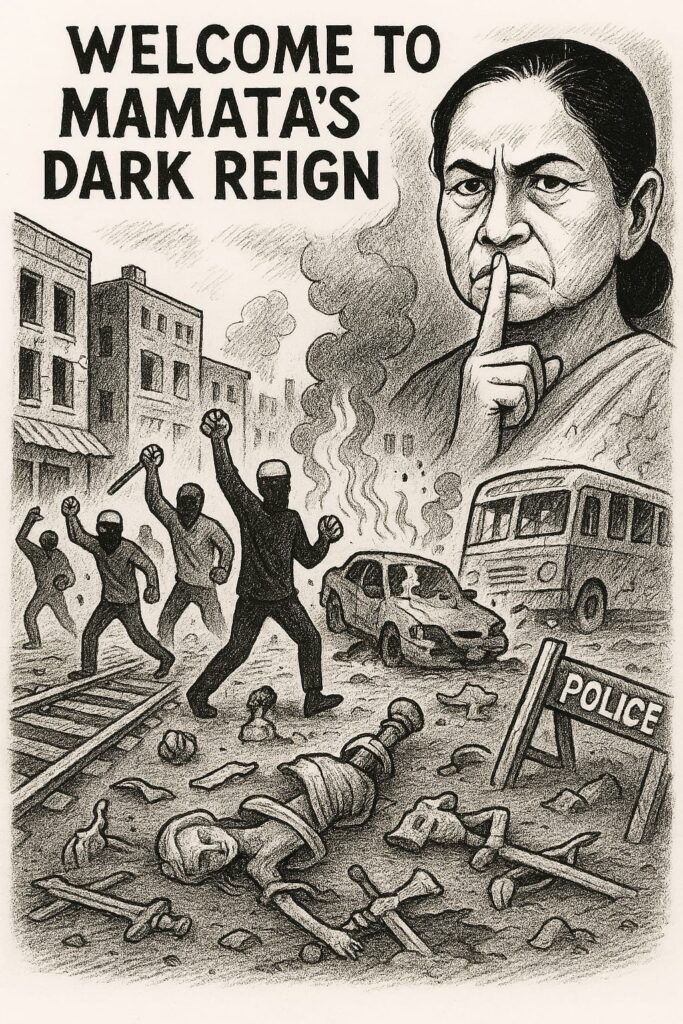🧨 Prologue: Bengal’s Boiling Point
West Bengal is no stranger to political storms, but what’s happening now is different. The Waqf land issue, combined with mass teacher unemployment and rising religious tensions, has triggered a deep fear among citizens — that Bengal is being reshaped, not by development, but by vote-bank experiments.
People are asking:
- Is Mamata Banerjee prioritizing Waqf politics over real governance?
- Why are job-qualified teachers still unemployed?
- Are Hindu families being pushed into legal and economic corners?
- Is this Bengal’s slow walk toward becoming another Bangladesh?
Let’s unfold this crisis — chapter by chapter.

🏠 Chapter 1: What is the Waqf Bill — and Why It’s Haunting Bengal
Waqf properties are land or assets donated for religious or charitable use under Islamic tradition. Every state in India has a Waqf Board — but in Bengal, the issue is murkier than ever.
Recently, landowners — many of them Hindus and even some Muslims — have received sudden notices or found their names replaced by the Waqf Board in land records.
📍 Example Case – East Bardhaman (2024):
Rina Das, a widow, discovered that her ancestral home, legally registered since 1952, is now listed as “Waqf land.” She has no idea how it happened. Her RTI (Right to Information) request is still unanswered.
Legal experts say:
“There is no uniform mechanism. In Bengal, Waqf entries are being made without proper land verification or public notification. It’s dangerous.”
🧑🏫 Chapter 2: Bengal’s Jobless Teachers – The Forgotten Warriors
While religious land disputes rage, over 30,000 qualified schoolteachers in Bengal remain jobless. Some have passed TET (Teacher Eligibility Test) as far back as 2016, but are yet to receive appointments.
🔥 Teachers’ protest in Salt Lake (2023):
Many fainted in hunger strikes. Police dragged them away. Mamata Banerjee’s government claimed “technical delays.” But insiders say:
“Funds and focus have shifted from public education to schemes aimed at Muslim voters.”
So while land is being gifted under Waqf claims, education remains frozen, and Bengal’s youth futureless.
🕌 Chapter 3: Hindu vs Muslim – The Street Reality
Mamata often says: “I’m the protector of minorities.” But critics say she’s actually the protector of selective votes.
In areas like Malda, Birbhum, and parts of Kolkata:
- Religious processions are being restricted
- Police act harshly on Hindu protests, but often soft on minority mobs
- Riots have erupted over petty religious disagreements
📽️ Viral video (Feb 2024): A group of Hindus were stopped from building a Kali temple because the land was “Waqf-listed overnight.” The land was owned by a freedom fighter’s family.
Even moderate Muslims are beginning to feel uneasy:
“Our faith is being used for votes. Real issues like jobs and safety are ignored.”
🧮 Chapter 4: The Bangladesh Parallels – Myth or Reality?
This is a controversial question, but it’s spreading fast online:
Is Bengal becoming the next Bangladesh?
Here’s why people are drawing comparisons:
| Factor | Bangladesh (Past 1990s) | Bengal (Today) |
|---|---|---|
| Waqf land misuse | Yes | Rising |
| Hindu land grab | Yes | Increasing complaints |
| Mass teacher protests | Yes (education ignored) | Yes |
| Political appeasement | Religious vote-centric | TMC targeting Muslim votes |
| Minority-led mobs | Unchecked in many areas | Often protected by silence |
Even migration patterns hint at fear: upper-caste Hindus, especially in border districts, are moving toward Odisha and Jharkhand, citing “safety and job loss.”

🗳️ Chapter 5: Mamata’s Strategy – Vision or Vote Addiction?
Let’s look at the political angle:
- TMC holds about 70% of Muslim vote share
- Over ₹4,000 crore allocated in last 3 years to minority schemes
- Waqf Board members often aligned with TMC interests
- Teacher appointment scams are under CBI and ED probe — still no resolution
Analysts say:
“Mamata isn’t running a state anymore. She’s managing a narrative. And that narrative is designed to keep one vote bank happy at all costs.”
Meanwhile, Hindu voices are silenced, teachers are dismissed, and youth are escaping the state for better lives.
📢 Chapter 6: Voices from the Ground
🎙️ Anirban Sinha, unemployed teacher:
“I don’t care about Waqf or riots. I want a job. But this government doesn’t even hear us.”
🎙️ Khadija Rehman, a Muslim student from Siliguri:
“Even we are fed up. We want peace, not more politics. My Hindu classmates are afraid. That’s not secularism.”
🎙️ Amitabh Bhattacharya, journalist:
“This is not communalism from the people. It’s top-down. Manufactured. Bengal is being turned into a lab.”
🧠 Final Chapter: What Now?
Bengal doesn’t need another religious identity crisis. It needs:
- ✅ Transparent land audits
- ✅ Fair teacher recruitment
- ✅ Equal law enforcement for all
- ✅ An end to religious vote-bank politics
If that doesn’t happen soon, the next 2026 state election won’t be about progress. It will be about survival — for truth, for education, and for Bengal’s soul.


Pingback: West Bengal or Bangladesh 2.0? Waqf Land Grab, Hindu Fear,
Pingback: Pakistan Dirty War in Kashmir The Hidden Truth Terrorism
Pingback: NEET UG 2025: Exam Insights, Paper Analysis, and Expert